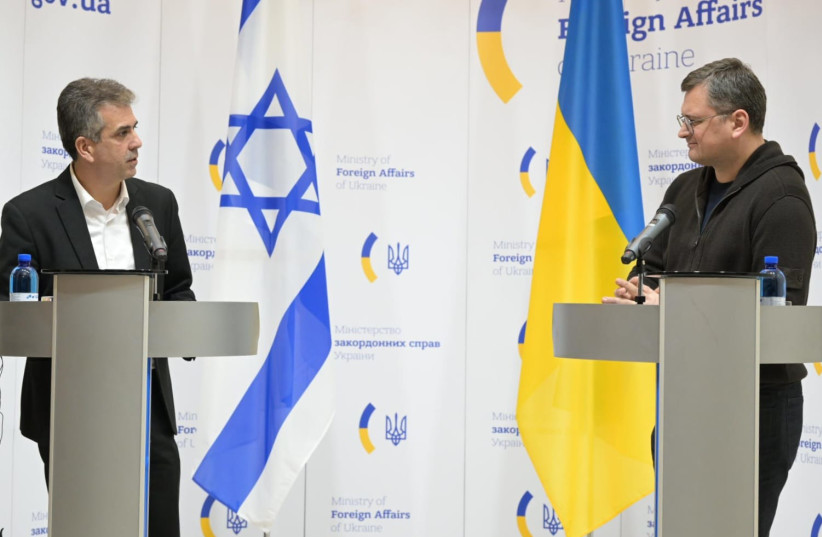As Ukrainians prepare to mark the first anniversary of the Russian invasion next week, the ongoing war has become their new reality. In the past 12 months, local NGOs have grown into being at the core of society, playing a crucial role in helping to collect and direct international humanitarian aid.
For more stories from The Media Line go to themedialine.org
One of the countries who has delivered humanitarian aid is Israel, whose foreign minister Eli Cohen was in Ukraine on Thursday for talks with his opposite number Dmytro Kuleba and President Volodymyr Zelensky.
Cohen announced that Israel has guaranteed $200 million for humanitarian aid and would provide Ukraine with help to develop early missile warning systems. “I am proud to stand with Ukraine in the face of these challenging times,” Cohen said, adding that Israel will back Zelensky's peace plan that will be presented to the United Nations General Assembly next week.
On the ground, Ukrainian non-governmental organization Community Self-Help (CSH) is one of the local groups that have restructured to address a range of issues, among them mental health, that have surged as a result of the war.
This includes, the NGO says, "providing medical and humanitarian support to hospitals and defenders of Ukraine, fighting the information war against Russian disinformation through newsletters, oral histories, and more, and providing psychologists and psychosocial care providers with the necessary training and tools."

Marta Pyvovarenko, a mental health specialist and an expert in ensuring the quality of mental health and psychosocial support services for CSH, told a press conference on Thursday that Ukrainians have faced various challenges they were unprepared for. But, she asserted, these are now being addressed by Ukrainian society in an effective way.
Unprepared for various challenges
"In this year, each Ukrainian acquired skills that they did not have before. Now, each Ukrainian is a professional in logistics, first aid and how to deal with a panic attack," she said. "This is called challenge resistance. Resilience is very important," Pyvovarenko said.
She told The Media Line that since the full-scale Russian invasion of Ukraine began, the number of people in need of psychological support has grown dramatically.
Pyvovarenko said that all psychologists have found themselves having to work longer hours and on more cases.
"It is a big challenge," she said, noting that while there has been an increase in people needing psychological help, many mental health professionals have traveled to bordering countries to work in safe places with Ukrainians who now live in new communities there.
"The war has had a huge impact on how Ukrainian psychologists work. We are very burned out," she said. "Now we have many patients who need psychotherapeutic support. People are going through very hard experiences."
Pyvovarenko said she and her team of psychologists treat patients who have been exposed to traumatic situations because of the war.
"Sometimes we treat people who have been captured and even tortured and they need support. This kind of experience really causes behavioral changes in many people," she said.
After living through such occurrences and other war situations, there are some who isolate themselves, others who experience symptoms of PTSD, and some who cannot sleep or even function in their day-to-day tasks, Pyvovarenko said.
She added that because of the war, many of the patients come to them suffering from two or three psychological, physiological and neurological issues. "They are all connected at the end of the day," she noted.
She explained that it is common among Ukrainians in the warzone to suffer from concussion due to Russian shelling, and that post-concussion syndrome can exacerbate many psychological issues such as post-traumatic stress disorder (PTSD).
"We also have a huge number of people with parts of their bodies amputated," she said, noting that this often causes mental health issues such as depression.
"For psychologists and psychotherapists in Ukraine, the whole experience has changed," she said.
These complicated professional challenges for mental health specialists, combined with a lack of available therapists, have driven CSH to look for creative solutions, Pyvovarenko explained.
The search for solutions
The organization decided to deal with this problem by drafting additional people to be part of the therapist workforce. To do that, they have partnered with a university in Michigan, USA.
"We are working with Wayne State University in Detroit to educate new psychotherapists to work in cognitive processing therapy, which is a great instrument to work with people who have some mental health problems after experiencing war situations," Pyvovarenko said.
The people undergoing training are mostly psychologists from schools or other institutions that already have a base knowledge of the subject, who then study working with victims of war in order to deal with PTSD, depression and a range of other mental health issues that are triggered by traumatic events.
Another challenge for which Ukrainians were unprepared a year ago, said Pyvovarenko, is the logistics skills to ensure both international and local aid reaches the people in need of it.
"Many countries collect medicine and send it to Ukraine, now we have much more effective and quicker logistical processes,” she said. “At the beginning of the war, it was a disaster and now it is quite effective," she added, noting that today there are organizations who are completely dedicated to supporting the logistics of humanitarian aid.
"We are people from the professional community, we never worked with logistics," she said, but stressed that over the past year, every Ukrainian has acquired skills that they never had before.
